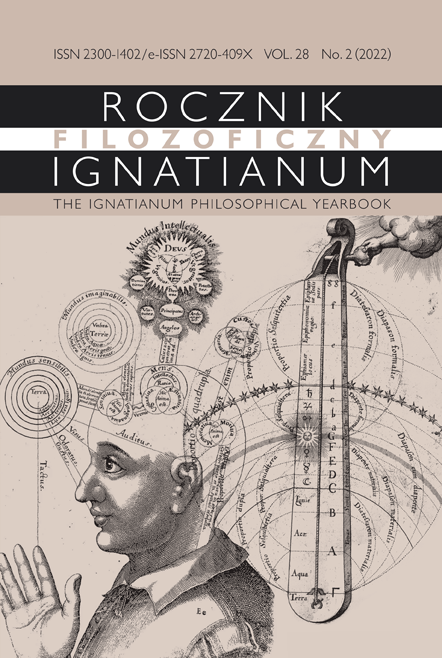In Relation to the Genesis of the Human Soul
On the hypothesis of Renewed Traducianism
Abstract
The purpose of this article is to reconstruct the hypothesis of renewed Traducianism. This hypothesis was formulated by Fr. Stanislaw Ziemiański, a Polish Jesuit and representative of Christian Philosophy. The subject of the scientific research presented in the article were articles and books in which the author formulated the hypothesis of renewed Traducianism. The formulated hypothesis was also the subject of debate, which, however, did not lead to any substantive resolution. The article was divided into two parts. The first part of the article presents the arguments that support the hypothesis of Traducianism. There is a particular focus on discussing the use of natural science in philosophical argumentation. The second part critically evaluates the arguments presented. It has been shown by means of philosophical argumentation that Fr Ziemiański’s conception is naturalistic and leads to the elimination of the concept of the soul. The article uses the method of reconstructing textual content, taking into account logical and methodological analysis. Thanks to this method, the research material was organized and subjected to logical and methodological evaluation. In conclusion, it is pointed out that it is worthwhile to develop even such controversial concepts as Fr. Ziemiański’s, as they inspire creative thinking and lead to the development of Christian philosophy. Hypotheses of this kind have value because they provoke creative debate, the fruit of which may be the modification of some of the established theses in anthropology and ethics that have been upheld by the power of tradition alone. The example of the hypothesis of renewed Traducianism clearly shows that it is possible to freely go back to the past and extract something of value from it and then present it in such a way as to attract the attention of the contemporary reader, who is characterised by an aversion to overly sophisticated philosophical speculation.
References
Lipton Peter, Inference to the Best Explanation (London: Routledge, 2004).
Maryniarczyk Andrzej, „Spór o opóźnioną animację Prawdziwy czy pozorny problem?”, w: Wokół genezy człowieka, red. Piotr Stanisław Mazur (Kraków: Wydawnictwo WAM, 2012), 67–68.
Ziemiański Stanisław, Teologia naturalna. Filozoficzna problematyka Boga (Kraków: Fakultet Filozoficzny Towarzystwa Jezusowego w Krakowie, 1995).
Koszteyn Jolanta, „Problem pochodzenia dusz ludzkich. Refleksje na temat artykułu Stanisława Ziemiańskiego SJ pt. Jedna czy wiele dusz?”, Forum Philosophicum: International Journal for Philosophy 9 (2004): 93–106.
Szubka Tadeusz, „Czy zmierzch filozofii analitycznej?”, Diametros 6 (2005): 94–104.
Ziemiański Stanisław, „Jedna czy wiele dusz?”, Forum Philosophicum 9 (2004): 73–92.
Ziemiański Stanisław, „Kilka uwag w związku z Refleksjami Jolanty Koszteyn”, Forum Philosophicum: International Journal for Philosophy 9 (2004): 107–110.
Tabaczek Mariusz, „Skąd się biorą dusze ludzkie”, https://contragentiles.pl/ glowne-dzialy/teizm-chrzescijanski/kim-jest-czlowiek/skad-sie-biora-dusze-ludzkie/ (dostęp: 02.02.2022).
Copyright (c) 2022 Jesuit University Ignatianum in Krakow

This work is licensed under a Creative Commons Attribution 4.0 International License.
The Yearbook only accepts materials for publication that are free of all conflicts of interest, and that in no way involve conflicts over authorship, copyright, etc. The Editors will take action against any cases of plagiarizing, ghostwriting1, guest/honorary authorship2, etc. Where co-authored work is concerned, the Author listed first is expected to take responsibility for the submission, and is required to make clear the contributions of all of the Co-Authors involved. In the event of the publication owing its existence to funding dedicated to this purpose, this fact should be made clear: e.g. in any note of thanks/acknowledgement, or in a footnote, etc. Explicit notification should be given of any form of reprinting, with the appropriate evidence of permission to publish being furnished as required. Any impropriety on the part of Authors/Reviewers risks exposing them to appropriate responses from the relevant institutions.
______
1 This term refers to instances of a person who has made an essential contribution being omitted from the list of authors, or from notes conveying gratitude and/or acknowledgement.
2 This occurs when a person who has made either an insignificant contribution or no contribution at all nevertheless appears on the list of authors.





